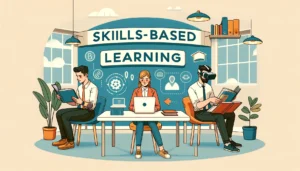How Workforce Reporting & People Analytics can help companies in Digital Transformation
- 5 Min Read
Last year alone companies spent over $1.3 trillion on digital transformation out of which $900 billion went to waste, making digital transformation the number one concern for companies in 2019.1 So why have some companies succeeded where others have failed in their digital transformation initiatives? Today businesses are going through digital transformation at the speed […]
- Author: Crunchr
- Date published: May 29, 2019
- Categories

Last year alone companies spent over $1.3 trillion on digital transformation out of which $900 billion went to waste, making digital transformation the number one concern for companies in 2019.1 So why have some companies succeeded where others have failed in their digital transformation initiatives?
Today businesses are going through digital transformation at the speed of light. The adoption of digital technologies – such as big data, artificial intelligence (AI), automation machine learning, internet of things and the cloud have not only redefined work but have also initiated industry 4.0. Digital transformation is the integration of these digital technologies into all areas of the business resulting in fundamental changes to work, how businesses operate and deliver value.
Digital Transformation is not only about technology, it’s about People
Time and again, digital technologies have promised to improve efficiency and organisational productivity, however, an important factor of this change process involves the adoption of technology by the workforce. So, this goes without saying that digital transformation is more than just selecting the right technology for an organisation and hence this process has a significant impact on the people side of the business. For leaders, it is important to recognise the fear of their workforce of being replaced due to the digital transformation process and so they need to emphasise this initiate as an opportunity for their workforce to update their expertise for the future of work. Organisational culture also plays a vital role in the digital transformation process. A recent example is that of a media and communications company that was digitally transforming its customer experience and during this process they realised that to do this they needed to empower their employee experience as well.2
Workforce Reporting and People Analytics as a strategic tool for the Digital Transformation process
The drivers of business value have changed dramatically over the past 30 years. Where previously, business value was tangible and accounted for on the balance sheet. Today more than 80 percent of business value is reliant on having a highly talented workforce that can disrupt markets and bring radical innovation.3 With this onset, business want to know whether the workforce costs are aligned with future earning potential, if people are fit for future work, whether the workforce is engaged, if the top talent are ready to lead tomorrow and so on.4 Workforce reporting and people analytics can enable businesses to gain insights into these pressing issues. People analytics encompasses HR, data from the entire workforce, and customer insights; It measures, analyses and knits together all this information to improve decision-making and performance. People analytics enables organisations to collect behavioural insights that can be correlated to already existing demographic and transactional information that are derived from workforce reporting.5
A recent global survey by Deloitte confirmed that 71 percent of executives consider people analytics to be either ‘important’ or ‘very important’ for their organisations.6 Insights obtained through people analytics have not only enabled organisations to manage workforce expectations across generations and continents, predict the changing workplace during this digital disruption;7 but also positioned HR as a fact based strategic partner of the business.8 Thus making workforce reporting and people analytics an indispensable component in the digital transformation process.
Digital Transformation and the role of HR
HR has a huge opportunity to really support the business through the digital transformation process. It is important for HR to be able to understand and connect the business strategy to the workforce strategy. HR’s role is the digital transformation process should be to plan, integrate and align the workforce needs with the business needs. This also includes aspects of strategic workforce planning to get the right talent at the right place at the right time. A key role for HR is to enable a positive employee experience and create a culture of digital adaptation and trust within the organisation.
One of the challenges for businesses today is to select from over thousands of technology softwares and tools that are the most appropriate to perform both its operational tasks and integrate efficiently into the wider business. Another key challenge arises around organising a multi-generational workforce expectation, creating a best fit culture and understanding the future of work. While many organisations are still unaware of how to best address these disruptions affecting business in every industry today, there are some organisations that are using workforce reporting and adopted people analytics to understand these complex workforce challenges.9
As HR leaders, we have a tremendous challenge of implementing digital transformation. Peter Drucker posed this challenge as, “The most important contribution management needs to make in the twenty-first century is to increase the productivity of knowledge work and knowledge workers.”10 The only way to meet this challenge is by using people analytics to understand the value generated by the workforce and gain the expected return from the $900 billion off-target spend.
You can read the original article on Crunchrapps.com.
-
https://hbr.org/2019/03/digital-transformation-is-not-about-technology?utm_content=87369859&utm_medium=social&utm_source=linkedin&hss_channel=lcp-9178211
-
https://youtu.be/u8zxmTLjCKU
-
https://blog.crunchrapps.com/blog/the-difference-between-hr-analytics-people-analytics-and-why-it-matters
-
https://www.hrdconnect.com/2019/04/17/taking-back-control-with-reporting-and-analytics-dirk-jonker-founder-ceo-crunchr/?utm_content=89638226&utm_medium=social&utm_source=linkedin&hss_channel=lcp-9178211
-
https://blog.crunchrapps.com/blog/the-difference-between-hr-analytics-people-analytics-and-why-it-matters
-
https://www2.deloitte.com/us/en/pages/consulting/articles/how-predictive-people-analytics-are-revolutionizing-human-resources.html
-
https://blog.crunchrapps.com/blog/workforce-analytics-the-key-to-improving-business-results
-
https://blog.crunchrapps.com/blog/heres-why-people-analytics-matters-for-hr
-
https://blog.crunchrapps.com/blog/5-reasons-why-companies-invest-in-people-analytics
-
http://www.forschungsnetzwerk.at/downloadpub/knowledge_workers_the_biggest_challenge.pdf








